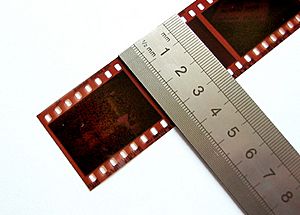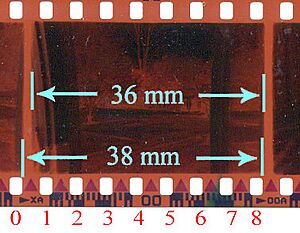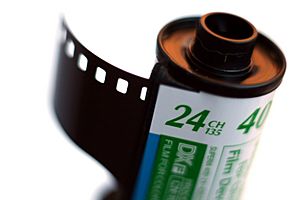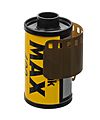135 film facts for kids
135 film is the official name for a type of photographic film that was once very popular. It is also known as 35mm film because it is 35 millimeters wide. This film was designed for taking still pictures, not for movies.
The ISO sets the rules for this film, known as Standard 1007. Kodak first introduced 135 film in 1934.
It quickly became very popular. By the late 1960s, it was used more than 120 film. Since then, 135 film has been the most common type of film for cameras. Even with new types like 828, 126, 110, and APS, 135 film stayed popular for a long time.
Contents
How 135 Film Works
Inside the Film Cassette
Each roll of 135 film comes in a special metal container called a cassette. This cassette keeps the film safe from light. It means you can put the film into your camera even when it's bright outside.
The film is attached to a small spool inside the cassette. It comes out through a soft, velvet-lined opening. One end of the film is cut into a special shape called a "leader." This leader helps you easily load the film into your camera. It fits into a slot on the camera's take-up spool.
Film Size and Holes
135 film has the same size and small holes (called perforations) as 35mm movie film. These holes are important. They help the camera move the film forward correctly after each picture is taken.
History of 135 Film Cameras
Many famous cameras used 135 film. The first camera designed for this film was the Leica I, made in 1927. This camera helped make 135 film very popular.
Over the years, many different cameras were made for 135 film. This included simple cameras like the Soviet Smena 6 and more advanced ones like the Kodak Retina II. Later, cameras like the Nikon F became very famous. The Nikon F6, made in 2004, was one of the last 35mm SLR cameras still produced.
From Film to Digital
Today, most cameras use digital sensors instead of film. These sensors capture images electronically. Some digital cameras have sensors that are the same size as a 35mm film frame. These are called "full-frame" digital sensors. They help digital cameras take very high-quality pictures.
Images for kids
-
A roll of Kodak 135 film for cameras
See also
 In Spanish: Formato 135 para niños
In Spanish: Formato 135 para niños
 | Ernest Everett Just |
 | Mary Jackson |
 | Emmett Chappelle |
 | Marie Maynard Daly |













